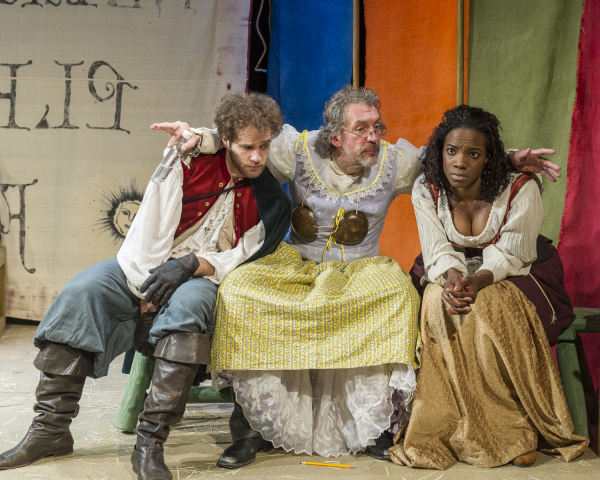The Faire

(© Jacob J Goldberg)
Drama is never quite as comedic as when conveyed through a bodice-choked bosom. That is readily apparent in Crystal Finn’s The Faire, making its world premiere at the Fourth Street Theatre in a production by Fault Line Theatre. This tale of medieval fetishism in a time of austerity is mostly hilarious, but also a little bit depressing.
The Faire takes place at the Renaissance Pleasure Faire in backwoods Northern California. Angela (Rachel Christopher) is a "serious actress" forced to take a job performing ridiculous abbreviated adaptations of Shakespeare like "Romeo and Flooziet" and "Titus Androgyny," written by the self-styled Bard "Jeff the Creator." Her costars are agèd burnout Olivier (Grant R. Krause doing his best Donald Sutherland in Kelly’s Heroes) and manic virgin Tilly (Jenny Seastone Stern). Her boyfriend, Drake (Kelsey Kurz), is a randy and socially stunted swordsman whom Angela seems to be with only for lack of options. (Plus, he has great shoulders.) Of course, she could always consider the advances of Ursula (Amanda Sykes), the hella-chill wench who sells churros during the show. (Are churros even period-appropriate food?) When a proclamation (in scroll form, naturally) comes down from the main office warning of impending closure due to flagging ticket sales, The Faire transforms from a play about a crappy summer job to a full-throttle Elizabethan Lord of the Flies.
Really, why should these people be so upset about the shuttering of the Faire and the loss of a job that many of them (especially Angela) despise? In actorly fashion, they raise the stakes to life or death: The closing of the faire = the end of the world. Perhaps this is a metaphor for the modern American economy, which feels like a never-ending battle royale to maintain a position at the top of a melting iceberg (about to collide with the Titanic). Finn’s storytelling oscillates between gritty realism and cartoonish fantasy, often to baffling and uneven ends. Are these real people with real lives and real bills to pay, or are they caricatures of Ren Faire archetypes?
Either way, Finn paints compelling portraits of her narcissistic subjects that are made three dimensional by the smart performances of the cast: Christopher offers a seemingly normal yet emotionally manipulative Angela. Kurz’s Drake is every bit the dickish alpha-male, strutting around and demanding sex while insulting his coworkers just because he can: He’s the only one of them with any real skills. With her deadpan delivery, Sykes wouldn’t seem out of place in an episode of Daria. You get the feeling that her character, Ursula, is the most sincere out of the bunch, and you really feel bad when Angela humiliates her.
Set designer Tristan Jeffers has devised a banner curtain with the words "Renaissance Pleasure Faire" printed in gothic lettering. It ingeniously rotates around, instantly transforming Jeff’s faux-Shakespearean stage into the backstage area where the far more interesting drama occurs. Izzy Fields’ Halloween Adventure costumes are appropriately busted. Director Aaron Rossini deftly choreographs this slo-mo demolition of an already dilapidated situation.
The Faire doesn’t seem to know how to end, finally landing on a ostensibly profound monologue that is, in reality, significant of very little. The existentialist undertones feel superfluous and tacked on. Enjoy this humorous and cringe-inducing frolic for what it does best: reveal the hot-mess tendencies of its self-centered characters. That is more than enough for a perfectly enjoyable play.











